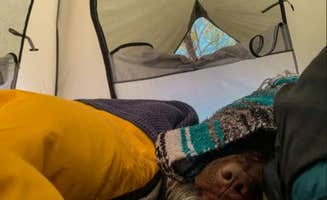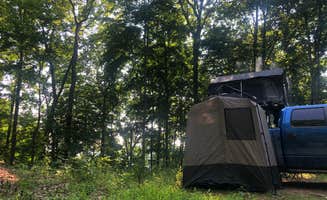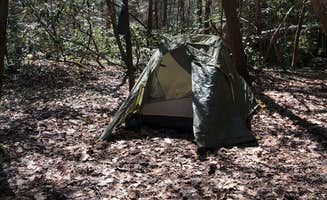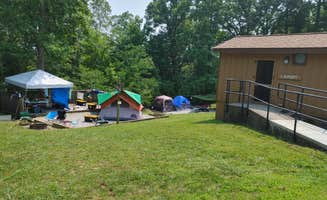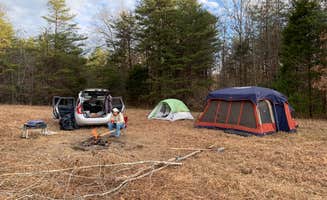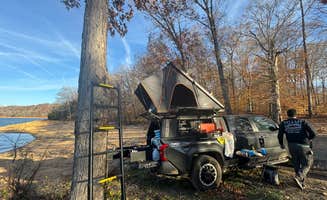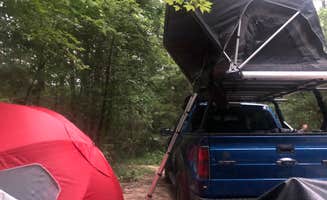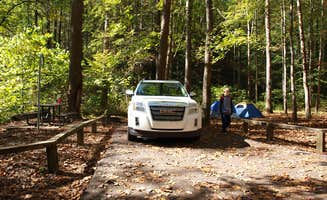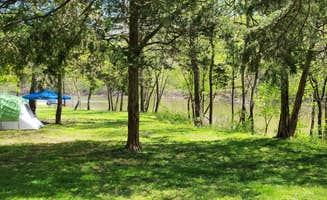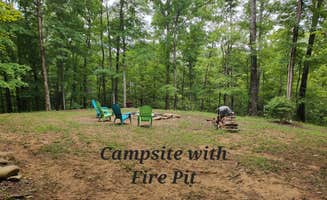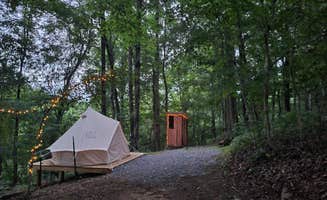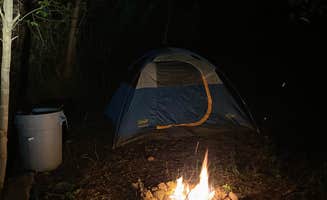Tent campsites near Oneida, Tennessee offer varied camping experiences across elevations ranging from 1,200 to 1,650 feet. The Cumberland Plateau region features sandstone bluffs and mixed hardwood forests providing natural wind breaks at many sites. Winter camping requires preparation for temperatures that regularly drop below freezing from December through February, with summer highs averaging in the mid-80s.
What to do
Fishing opportunities: The Big South Fork National River provides excellent smallmouth bass fishing access at Burnt Mill Bridge Loop campsites. "My son and I went down near the river, and camped and did some fishing," reports one camper who notes the river gets busy with "rafters and kayakers" during peak seasons but remains "not crowded, especially compared to the Smokies."
Waterfall hikes: Multiple waterfall trails connect to primitive tent sites throughout the area. At Breathtaking Waterfall and Campground, campers can access cascades directly from their campsites. This newer camping area offers just 5 walk-in tent sites with picnic tables and fire rings.
Wildlife viewing: The North Cumberland Wildlife Management Area provides opportunities to spot elk, particularly in early morning and evening hours. Campers should bring binoculars and maintain at least 50 yards distance from wildlife. One camper noted, "The area is full of Elk too, so keep an eye out!" when staying in the Royal Blue Unit.
What campers like
Secluded waterfront sites: Waterfront camping at TVA Public Land-Fork Bend receives consistently high ratings for privacy and water access. "There were many other spots they could have accessed the lake so we found this very invasive," reported one camper, highlighting the importance of choosing sites away from popular swimming areas if seeking privacy.
Rock formations: The unique geology of the region creates camping opportunities near dramatic rock features. A camper at Burnt Mill Bridge Loop described "stunning rock formations and some smaller waterfalls" along trails. Another mentioned that "there are ladders, stairs, scrambling, rocks, and steep terrain" making the journey challenging but rewarding.
Hammock-friendly terrain: Many backcountry sites offer perfect hammock setups between mature trees. "We found a good place to set up our hammock gear a little ways off of the trail, then we fixed our supper at a nearby over hang," reported one visitor to Backcountry Camping in Big South Fork, noting the "wonderfully cold night" in late March.
What you should know
Road conditions: Many tent camping areas require navigating unpaved roads. A camper at TVA Public Land-Fork Bend warns, "The road back is a gravel/dirt road a few miles into the woods. Although bumpy 4x4 isn't necessary as we were able to get our 85 GMC van back here."
Permit requirements: Backcountry permits are mandatory for camping in Big South Fork areas and cost $5 per person for up to 7 nights. One camper reminds others to "Make sure you have your permit with you while camping" as rangers do check regularly, especially during peak seasons.
Cell service variability: Connectivity changes dramatically based on elevation and location. "We had full cell service at our spot, we were on top of a ridge," reports a camper at North Cumberland WMA- Royal Blue Unit, but cautions "there was another road that was going down, I'm not sure you would have service down there."
Tips for camping with families
Kid-friendly sites: Not all tent campsites near Oneida are suitable for children. At Clifty Campground, "Sites 40-47 have electric and water" making them more convenient for families, while "the privacy of site 49 was worth the lack of electricity and water" for those prioritizing seclusion over amenities.
Wildlife education: Turn wildlife spotting into educational opportunities by borrowing field guides from the Oneida Public Library before your trip. "We did take note of several other really good spots too," mentioned a camper at North Cumberland, indicating plenty of locations for wildlife observation.
Swimming safety: Several campgrounds offer swimming access, but water conditions change seasonally. At TVA Public Land-Fork Bend, a camper reported finding "a tiny beach about 100 yards east of my site for wading" but noted "muddy banks everywhere else" making water entry points limited.
Tips from RVers
Tent-only sections: Several campgrounds in the region designate tent-only camping areas. Clifty Campground offers "All sites with electric/water and NO RVs" in certain sections, with "2 sites at either end totally primitive." This separation creates a quieter tent camping experience.
Small trailer considerations: While many primitive sites don't accommodate RVs, small teardrop trailers can access some areas. "We chose a spot on top of a ridge, and had good cell reception" noted an RV camper who used a rooftop tent at North Cumberland WMA-Royal Blue Unit, suggesting similar accessibility for small trailers.


